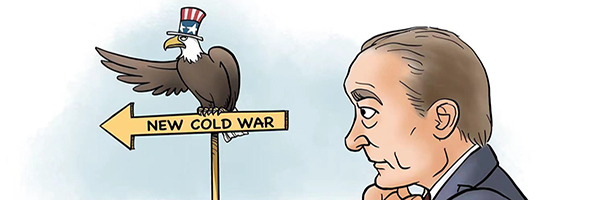Multipolarity will prevail as Washington promotes decoupling in vain
 December 1, 2022 — In an important speech on economic strategy, delivered at a recent forum organised by the newspaper Süddeutsche Zeitung, German Chancellor Olaf Scholz called for Germany to orient itself toward the reality of an “increasingly multipolar world” that is arranging itself right now.
December 1, 2022 — In an important speech on economic strategy, delivered at a recent forum organised by the newspaper Süddeutsche Zeitung, German Chancellor Olaf Scholz called for Germany to orient itself toward the reality of an “increasingly multipolar world” that is arranging itself right now.
Scholz stated, countering a narrative that Europe and North America can simply return to reliable economic growth following the disruptions of COVID-19 and the crisis in Ukraine, that the growing strength of Asia had fundamentally changed the international landscape. There will be no going back to the good old days in which North America and Western Europe enjoyed stable economic growth and high employment rates.
Inter alia, this is a tacit admission that the West’s wealth has been built to a significant degree on the basis of extraction from the developing world. The “good old days” were when Europe and North America were rich and Asia, Africa, the Middle East, Latin America and the Caribbean were poor and subordinate
What was the material foundation of these good old days? It was colonialism, the transatlantic slave trade, the genocide of the indigenous peoples of the Americas, the brutal underdevelopment of Africa, the Opium Wars, and more. The expansionism and systematic pillage during the 16th, 17th, 18th and 19th centuries created a profoundly lopsided world, dominated by a handful of Western capitalist powers.
This cosy arrangement was disrupted by the October Revolution, which marked the beginning of a new era of world history. The construction of socialism in the Soviet Union, China, Korea, Vietnam, Eastern Europe and Cuba – and the mighty wave of anti-colonial liberation in the post-WWII period – brought about a profound transformation in global politics.
But the US and its allies have worked ceaselessly to undermine the socialist world and to impose neocolonial domination in those places where colonial rule had been dismantled. This is the context for the Cold War; for the Korean War, the Vietnam War; the overthrow of progressive governments from Indonesia to Grenada to Chile; the support for apartheid regimes in South Africa, Zimbabwe and elsewhere.
Wars in Yugoslavia, Iraq, Afghanistan and Libya, along with several rounds of NATO expansion, were early episodes in the Project for a New American Century – the US proposal for consolidating and expanding its hegemony in the post-Soviet era. But China and other countries, particularly in the Global South, have been moving along a different trajectory, in pursuit of a multipolar, multilateral project, based on the principles of the UN Charter.
This strategy is directed toward lasting peace and worldwide sovereign development. Its manifestation in reality is clear enough: while the US is by far the world leader in military spending, military bases, wars of aggression, regime change operations, unilateral sanctions and economic coercion, China is the world leader in mutually-beneficial trade, infrastructure development, and renewable energy.
The Biden administration’s response to the rise of multipolarity has been to escalate the US-led new Cold War and to promote decoupling, dividing the world into two competing and exclusive blocs. While Biden has presented this division as being between democracies and autocracies, in reality the group he is trying to establish is based on the George W Bush doctrine: you are either with us or against us.
The US created AUKUS last year – a group of countries united by shared whiteness and commitment to imperialism – in order to bolster the military encirclement of China. Meanwhile Washington has taken advantage of the crisis in Ukraine to recruit new members to NATO and attempt to weaken Russia by prolonging the conflict (a strategy that has certain parallels with the US’ role in Afghanistan in the 1980s).
European powers in particular are being subjected to tremendous pressure to “decouple” from China and Russia, but such a decoupling doesn’t serve the interests of the people of Europe. It was therefore an assertion of political independence for Scholz to travel to Beijing in early November – the first visit to China by a Western head of state since the start of the pandemic, and just days after the close of the 20th National Congress of the CPC.
The trip took place in spite of the bitter criticism of certain Cold Warriors among the German political class, not to mention the rumblings of disapproval from Washington. But Scholz appears to have realised – as did his predecessor, Angela Merkel – that the days of unipolarity and hegemony are over.
Before leaving for Beijing, he stated bluntly that “China remains an important business and trading partner for Germany and Europe — we don’t want to decouple from it.”
Such a rupture in the transatlantic alliance is to be very much welcomed. The people of Europe and the world will only lose from any New Cold War or decoupling. The world’s future is multipolar and peaceful.
*
The author is a British author and independent political commentator. opinion@globaltimes.com.cn
